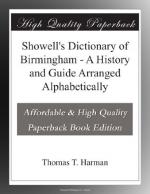Taxes.—Would life be worth living if we had to pay such taxes as our fathers had to do? Here are a few:—The hearth or chimney tax of 2s. for every fire-place or stove in houses rated above 20s. per annum was imposed in the fifteenth year of Charles II.’s reign, but repealed in the first year of William and Mary, 1689; the owners of Edgbaston Hall paid for 22 chimneys before it was destroyed in 1668. In 1642, there was a duty of L4 a pair on silk stockings. A window tax was enacted in 1695 “to pay for the re-coinage of the gold coin,” and was not entirely removed till July 24, 1851; from a return made to Parliament by the Tax Office in 1781, it appeared that the occupiers of 2,291 houses paid the window tax in Birmingham; there was collected for house and window tax in 1823, from the inhabitants of this town, the sum of L27,459 12s. 1-3/4d., though in the following year it was L9,000 less. Bachelors and widowers were rated by 6 and 7 William III., c. 6, “to enable the King to carry on the war against France with rigour.” Births, marriages, and deaths were also made liable to duties by the same Act. The salt duties were first levied in 1702, doubled in 1732, and raised again in 1782, ceasing to be gathered in 1825. The price of salt at one period of the long Peninsular war rose to L30 per ton, being retailed in Birmingham at 4l. per lb. Carriages were taxed in 1747. Armorial bearings in 1798. Receipts for money and promisory notes were first taxed in 1782. Hair powder tax, of 21s. per annum, was first levied in 1795. In 1827, there was a 1s. 3d. duty on almanacks. The 3s. advertisement duty was reduced to 1s. 6d. in 1833, and abolished August 4, 1853. The paper duty, first put on in 1694, was repealed in 1861; that on bricks taken off in 1850; on soap in 1853; on sugar in May, 1874, and on horses the same year. Hats, gloves, and linen shirts were taxed in 1785; patent medicines, compound waters, and codfish, in 1783; in fact every article of food, drink, and clothing required by man from the moment of his birth until his burial, the very shroud, the land he trod on, the house he lived in, the materials for building, have all been taxed. For coming into the world, for living in it, and for going out of it, have Englishmen had to pay, even though they grumbled. Now-a-days the country’s taxes are few in number, and per head are but small in amount, yet the grumbling and the growling is as heavy as of old. Can it arise from the pressure of our local rates? Where our fathers paid 20s. to the Government, we do not pay 5s.; but where the old people gave 5s. in rates, we have to part with 25s.
Telegraphs.—The cable for the first Atlantic telegraph was made here. Its length was 2,300 nautical miles, and it required 690,000 lbs. of copper in addition to the iron wire forming the strand, of which latter there was about 16,000 miles’ length. The first time the “Queen’s Speech” was transmitted to this town by the electric telegraph was on Tuesday, November 30, 1847, the time occupied being an hour and a half. The charge for sending a message of 20 words from here to London, in 1848, was 6s. 6d. The Sub-Marine Telegraph Co. laid their wires through Birmingham in June and July, 1853.




